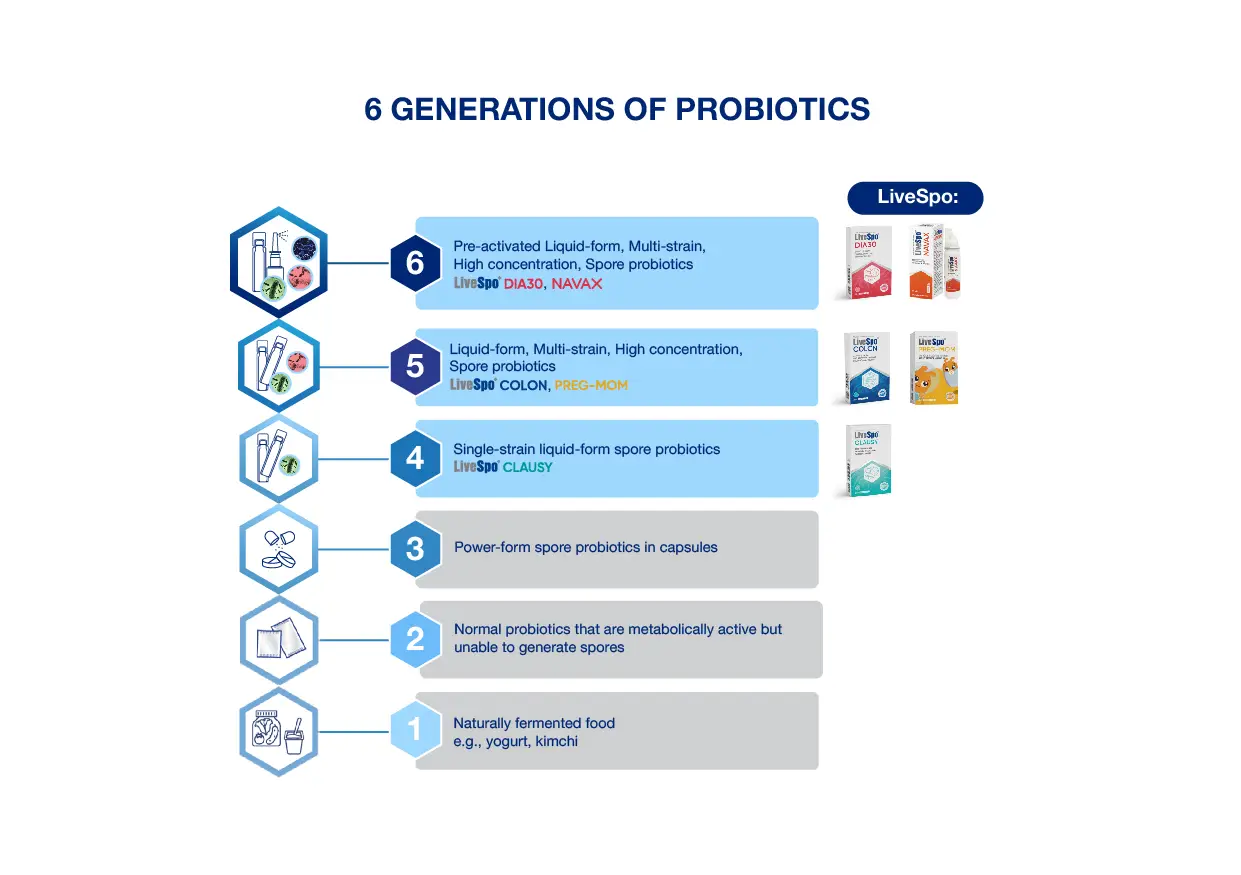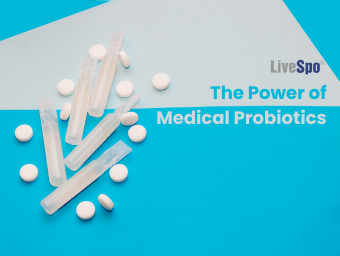What are Medical Probiotics?
Medical probiotics, also known as probiotic supplements, are precisely formulated products containing live microorganisms such as bacteria or yeast strains. These probiotics are crafted with meticulous attention to address specific medical conditions and contribute to overall health and well-being. Unlike regular probiotics found in foods, medical probiotics are designed with therapeutic intentions, offering targeted benefits for various health aspects.
The microorganisms within medical probiotics, when ingested in appropriate quantities, play a crucial role in fostering a balanced microbial environment within the body. This, in turn, can positively impact digestive health, regulate the immune system, and potentially influence other physiological functions. The emergence of medical probiotics reflects an exciting frontier in healthcare, where the understanding of the microbiome’s role opens avenues for tailored interventions to support health and address specific medical concerns.
What are probiotics and their mechanism of action?

Probiotics are living bacteria that provide health benefits to the hosts, especially the digestive system. When talking about bacteria, people often think of them as disease-causing agents. However, the human body is fully filled with bacteria, including both useful bacteria (probiotics) and harmful bacteria.
Probiotics are commonly referred to as “good” or “beneficial” bacteria because they help maintain a healthy gut when used in appropriate doses. Using probiotics for the prevention or supportive treatment of digestive disorders is a natural approach and perhaps the most common application of probiotics, as most of their health benefits are directly or indirectly related to the digestive system. They can commonly be found in the form of health supplements, which are added to various food products or yogurt.
Mechanism of action (Source: Livespo.vn)
Scientific researchers have been and are currently trying to uncover the mechanism of action of probiotics, which can help promote a healthy body:
- Under an imbalanced beneficial bacteria condition in the body, such as after the use of antibiotics, probiotics are able to replace the lost native beneficial bacteria or even create a favorable environment to increase the numbers and diversity of native beneficial bacteria as well as reduce the diversity of harmful bacteria.
- They are able to re-balance the gut microflora between beneficial and harmful bacteria to keep the body functioning normally.
- Probiotics can secrete antimicrobial substances to inhibit or kill harmful bacteria, preventing infections.
- Probiotics play a crucial role in the maturation of the digestive system through the ability of actively participate in the production of mucus and the activity of enzymes in the gastrointestinal mucosa.
The common beneficial bacteria used as medical probiotics.
Many common beneficial bacteria, including both bacteria and fungi, are classified as probiotics. They all have different health benefits, but most of them belong to the following groups of microorganisms:
Lactobacillus spp.: A well-researched type of bacteria and the most widely used as probiotics. It is commonly found in yogurt and other fermented foods. Different strains can help prevent and support the treatment of diarrhea. Moreover, it is helpful in cases of people suffering from lactose or milk sugar intolerance (unable to digest lactose or the sugar in milk).
Bifidobacterium spp.: Anaerobic bacteria, commonly found in milk products, which can help alleviate symptoms of Irritable Bowel Syndrome (IBS) and some other gastrointestinal disorders.
Bacillus spp.: A type of beneficial bacteria which have the ability to form heat-resistance spores. There are numerous studies representing their probiotics properties in supportive treatment of gastrointestinal and respiratory microbial disorders, as well as enhancing the immune system,….
Saccharomyces boulardii: A type of yeast found in alcoholic beverages such as wine, beer, and some bio-products, which help prevent diarrhea and other digestive disorders.
These various probiotic strains offer different health benefits and are commonly incorporated into dietary supplements or functional foods to promote overall well-being.
Sources of Probiotics
Probiotics, the beneficial microorganisms that contribute to our gut health, can be found in an array of sources. These sources offer a diverse range of probiotic strains, each with unique potential health benefits. Here, we delve into the 6 primary sources that serve as reservoirs of these friendly bacteria

Naturally Fermented Foods and Beverages
- Yogurt: Perhaps the most widely recognized probiotic source, yogurt is crafted by fermenting milk with specific bacterial strains, such as Lactobacillus and Bifidobacterium. It’s a delicious and versatile option for introducing probiotics into the diet.
- Kefir: This fermented dairy product is made by culturing milk with kefir grains, which are a combination of bacteria and yeast. Kefir offers a diverse range of probiotic strains and is rich in nutrients.
- Sauerkraut: Fermented cabbage is a classic probiotic-rich food. The fermentation process involves lactic acid bacteria, which contribute to both its tangy flavor and probiotic content.
- Kimchi: A staple in Korean cuisine, kimchi is a fermented vegetable dish. It’s typically made with napa cabbage and various seasonings, including probiotic-promoting spices.
- Tempeh: Originating from Indonesia, tempeh is a fermented soybean product. Its firm texture and nutty flavor make it a popular choice among vegetarians and vegans.
Or dairy alternatives for lactose intolerance
- Non-Dairy Yogurt: With the rise of dairy alternatives, non-dairy yogurts made from coconut, almond, soy, or other plant-based milks are now available. These options often contain added probiotic strains.
- Non-Dairy Kefir: Similar to non-dairy yogurt, non-dairy kefir made from plant-based milks and kefir cultures provides a probiotic boost to those avoiding dairy.
Regular Food Supplements in different forms
- Powder Form: Probiotic powders can be easily mixed into beverages, smoothies, or foods, allowing for flexible dosing and a potentially wider range of strains.
- Capsules and Tablets: Probiotic supplements are available in various forms, including capsules and tablets. These provide a convenient way to consume specific strains and quantities of probiotics.
- Liquid Form:
- Single-strain liquid spore probiotic
- Multi-strain liquid spore probiotic
- Pre-activated SPL multi-strain liquid spore probiotic
The best age to consume food supplements and guidance
Determining the optimal age for consuming food supplements is crucial to maintaining one’s health. While the specific period may vary depending on individual needs and health conditions, there are some general guidelines to consider. In most cases, it’s advisable to introduce food supplements into one’s diet during adolescence or early adulthood. This stage is when nutritional requirements are typically high due to growth and development.
However, individuals of all ages, including kids, seniors or pregnancy, can benefit from certain supplements to address age-related issues such as bone health or cognitive function. Consulting with a healthcare professional or nutritionist can provide personalized guidance on the most suitable supplements and the ideal age to start incorporating them into your diet.
How do medical probiotics affect your body?
With specific health conditions
They can be used for supportive treatment of the following digestive disorders:
- Irritable Bowel Syndrome (IBS).
- Inflammatory Bowel Disease (IBD).
- Infectious diarrhea (caused by viruses, bacteria, or parasites).
- Antibiotic-associated diarrhea.
Additionally, some studies have shown that probiotics can prevent and reduce symptoms in other parts of the body, such as:
- Skin inflammation, such as eczema (atopic dermatitis).
- Urinary tract infection and vaginal infection.
- Oral inflammation.
- Allergy and cold prevention.
With other body parts
“Maintaining a balance of the probiotic system in the 7 entry points of the body to protect health and wellness.”
Have we unintentionally overlooked “a vital part” of our body?
The microbiome is an integral part of the body. Each person contains from 10 trillion to 100 trillion microorganisms, including beneficial and harmful bacteria. For centuries, when discussing beneficial bacteria, most believed they only existed in the gut. However, the reality is that healthy bacteria are present throughout the body. They are primarily concentrated in the 7 vital entry points, namely:

The multifaceted impact of probiotics on different parts of your body
- Gut health
Let’s start with the most well-known benefit. Probiotics, which include strains like Lactobacillus, Bifidobacterium, and Bacillus, help maintain a healthy balance of gut bacteria. This balance is crucial for proper digestion, absorption of nutrients, and a well-functioning immune system. When the scales tip in favor of harmful bacteria, digestive issues like bloating, diarrhea, or constipation can occur. Probiotics step in to restore equilibrium, promoting smoother digestion.
- Gut and brain connection
The gut-brain connection is a fascinating area of research. Probiotics can influence your mood and cognitive function through this connection. Recent studies suggest that a balanced gut microbiome is associated with better mental health. Some probiotic strains produce neurotransmitters like serotonin, often referred to as the “feel-good” hormone. By nurturing your gut, you may also be supporting a happier, more focused mind.
- Vaginal health
Women, in particular, benefit from probiotics’ influence on vaginal health. Lactobacillus strains dominate the healthy vaginal microbiome, creating an acidic environment that discourages harmful pathogens. Probiotic supplements or foods can help maintain this delicate balance, reducing the risk of common issues like yeast infections and bacterial vaginosis.
- Respiratory health
Your respiratory system may not seem connected to your gut, but there’s growing evidence that a balanced gut microbiome can positively impact your lungs. Probiotics may help modulate the immune response, potentially reducing the severity and frequency of respiratory infections. This connection between gut and lung health is an exciting area of research, especially in the context of allergies and asthma.
Incorporate medical probiotics into the diet
Our bodies must reap their full benefits. Add probiotic-rich foods like yogurt, kefir, kimchi, sauerkraut, and kombucha to your daily meals. These foods can be delicious additions to your diet and provide a natural source of beneficial bacteria. Additionally, consider taking high-quality probiotic supplements, especially if you have specific health goals or dietary restrictions.
When choosing a probiotic supplement, ensure it contains diverse strains of bacteria, and a high CFU (colony-forming units) count for optimal effectiveness. To enhance their survival in your gut, consume probiotics with prebiotic-rich foods like garlic, onions, and asparagus. This nourishes the probiotics, allowing them to thrive and support your digestive and immune systems. Regularly consuming probiotics and a balanced diet can help you maintain a harmonious gut microbiome and promote overall health.
How to consume safely with Clinical trials and scientific research?
Consuming supplements safely is paramount, and it’s crucial to rely on clinical trials and scientific research to make informed choices. When considering any supplement, including probiotics, look for products that have undergone rigorous clinical trials. These trials help assess their safety, efficacy, and potential benefits. Scientific research provides valuable insights into the specific strains of probiotics that may address your health concerns. Always consult a healthcare professional before starting any new supplement regimen, especially if you have underlying health conditions or are taking medications. By basing your choices on clinical trials and scientific evidence, you can enhance the safety and effectiveness of your supplement consumption and promote your overall well-being.
The US FDA (Food and Drug Administration) regulates probiotics to be used as either foods or dietary supplements, not as drugs, because probiotics have a long history of safe use. Unlike pharmaceutical companies, probiotic nutritional supplement manufacturers are not required to prove their products are safe or effective if the bacterial strains are generally recognized as safe or have been approved by the FDA. In general, probiotics are considered safe for most people. However, some individuals experiencing immune system issues or other severe health conditions should be cautious when using them. In some specific cases, it is recommended to consult a doctor for advice.






